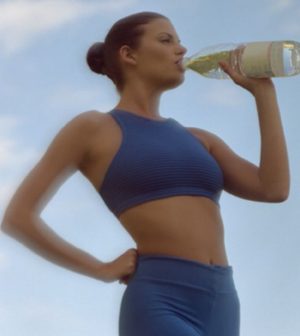- Could Your Grocery Store Meat Be Causing Recurring UTIs?
- Are You Making This Expensive Thermostat Error This Winter?
- Recognizing the Signs of Hypothyroidism
- 10 Strategies to Overcome Insomnia
- Could Artificial Sweeteners Be Aging the Brain Faster?
- Techniques for Soothing Your Nervous System
- Does the Water in Your House Smell Funny? Here’s Why
- Can a Daily Dose of Apple Cider Vinegar Actually Aid Weight Loss?
- 6 Health Beverages That Can Actually Spike Your Blood Sugar
- Treatment Options for Social Anxiety Disorder
Are Enhanced Waters Better for Your Health?

You’ll find plenty of nutrient-enriched flavored waters on grocery shelves, but are they any better for your diet than a glass of water with a squeeze of lemon?
Many drinks promise health benefits, from more energy and better exercise performance to a stronger immune system. The latest fad is alkaline water, with claims that its manipulated pH has health benefits. But none of the claims of enhanced water products have been substantiated with serious research.
In fact, Coca-Cola, parent company of Vitaminwater, voluntarily agreed in 2016 to remove claims from its labels to end a lawsuit brought by the Center for Science in the Public Interest seven years earlier.
Drilling down into what’s inside the bottle brings up other concerns. Some products contain unnecessary nutrients. For example, most people who perform average amounts of exercise don’t need to replace electrolytes the way athletes do, and don’t need enhanced “sports” waters and other drinks, but there’s no science to support that either.
Other products contain excessive amounts of some nutrients. Among 46 drinks tested in one study, most had at least one nutrient in excess of the daily required amount. Yet other than vitamin D, most Americans aren’t lacking in vitamins, and getting an abundance of certain nutrients can pose health risks.
Of greater concern, whether you’re limiting calories to lose weight or want to eat for optimal health, some waters contain more sugar per bottle than the recommended daily limit of 6 teaspoons for women and just shy of the 9 teaspoon limit for men. If flavored water fills you up or you simply like the taste, read labels and buy brands without these added and useless calories. Don’t go by a product name alone to make your selections.
Beware of any claims still listed on the packages. These typically aren’t healthy soda alternatives or good sources of fruit; despite fruity names, most have just 1 percent juice, if any.
Keep these tips in mind when shopping for beverages for your children, too. A study of nearly 1,000 parents found that almost all gave enhanced water drinks to their kids, not realizing how much sugar is in them, and relying on packaging claims to make buying decisions.
More information
The Center for Science in the Public Interest has more on alkaline waters.
Source: HealthDay
Copyright © 2026 HealthDay. All rights reserved.










